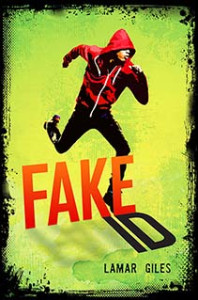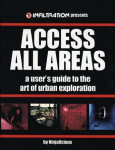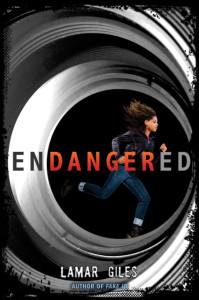I’m big on beginning novels in media res (in the middle of things), meaning jumping into a scene before explaining who’s who or what’s what, no back-story.
But if you insist on starting with a character who talks to the reader, do it well. Make it fresh. Aspire to do it the way Lamar Giles does in Endangered. He’s mastered this sort of opening. Here are some of the lines in his first chapter:
I’ve haunted my school for the last three years.
I’m not a real ghost; this isn’t one of those stories. At Portside High I’m a Hall Ghost. A person who’s there, but isn’t…
Jocks don’t bump into me, and mean girls don’t tease me, and teachers don’t call on me because I don’t want them to. Hiding in plain sight is a skill, one I’ve honed. My best friend, Ocie, calls me a Jedi ninja, which is maybe a mixed metaphor and redundant. But it’s also kind of true…
We’re all something we don’t know we are…
My target is stationary, in a parked car, one hundred yards away. A quick lens adjustment turns her face from fuzzy to sharp despite the darkness. An easy shot. Which I take.
Keachin Myer’s head snaps forward, whiplash quick.
I shoot again.
Her head snaps back this time, she’s laughing so hard. Odd, I was under the impression the soulless skank had no sense of humor…
I rub my tired eyes, and switch my Nikon D800 to display mode… Keachin—rendered in stark monochrome thanks to the night-vision adaptor fitted between my lens and my camera’s body—belly-laughing at whatever joke the current guy trying to get in her pants is telling. Basically, Keachin being what everyone in Portside knows she is. Rich, spoiled, and popular. Nothing the world hasn’t already gleaned about this girl. Nothing real.
I intend to fix that. If she ever gives me something good.
Keachin Myer is as clueless about what she is as anyone else. And being unfortunately named is not the part she’s unaware of. If you let her tell it, her parents strapped her with such an ugly handle because, well, she couldn’t be perfect, right?
Maybe a mixed metaphor and redundant… An ugly handle. This is smart writing—tight, engaging, real. And I’m thrilled that the author is here to share his process in crafting such a compelling voice.
 Lamar Giles burst onto the YA fiction scene last year with Fake ID, a finalist for the Edgar Award. He’s a founding member of the We Need Diverse Books campaign, and now has multiple contracts with HarperCollins and Scholastic for forthcoming books. The guy is so busy writing, he couldn’t do this interview when I first asked. I had to wait a few months.
Lamar Giles burst onto the YA fiction scene last year with Fake ID, a finalist for the Edgar Award. He’s a founding member of the We Need Diverse Books campaign, and now has multiple contracts with HarperCollins and Scholastic for forthcoming books. The guy is so busy writing, he couldn’t do this interview when I first asked. I had to wait a few months.
A.B. Westrick: Lamar, welcome! And thank you for taking time away from fiction-writing to tell us a little about your process. I read Endangered in two days—it’s the classic can’t-put-it-down.
Lamar Giles: Thank you for having me! I’m glad you found ENDANGERED unputdownable.
ABW: So let’s start with that voice. Would you talk a little about where it came from? What was your inspiration for this character, who goes by Lauren… or Panda… or Gray, depending on circumstances?
LG: I had a couple of things in mind as I refined her voice. As we know, writing is re-writing, and some of the best, most-nuanced stuff tends to come out in the 2nd or 3rd drafts for me. While doing those drafts, I reminded myself that Panda/Gray believes she is doing good, and she does not know that she’s wrong. That helped me craft a more haughty voice that is at times indignant. That mindset allowed for some very specific things in the passages you quoted. I wanted to romanticize what is, essentially, an extremely creepy peeping tom/stalker exercise. I wanted the reader to co-sign on this massive invasion of privacy. By alluding to popular supernatural tales (“I’ve haunted my school…”) and revered pop culture imagery (Jedi Ninja), I’m working to get readers on board, so they too are romanticizing with her. But I couldn’t have gotten there without that simple thesis…SHE doesn’t know better.
In terms of inspiration, Panda came from another story I was working on (and may return to in the near future). It was an urban fantasy, and she was a supporting character. The story wasn’t working, and when my agent (who is an awesome friend and collaborator) read it, she immediately keyed on Panda because of the backstory of her nickname, and asked “Can you do anything with her?”
It was an interesting challenge because her character probably took up a total of only 10 pages in a 300+ page manuscript. She was a yearbook photographer, so I decided photography should remain a part of the story, but how? The breakthrough came when I recalled an experience I had with a photographer years ago. I was getting some head shots for my website. During the shoot, the photographer mentioned his former occupation: Army Sniper. I asked what made him go into photography after such a career, and he said, “The skills are transferrable.”
Whoa!
I can’t always explain how I get to my final writing product, but Panda’s one I can summarize neatly: she’s a sniper without a rifle.
ABW: Whoa is right. I could feel the sniper element in her scenes, and now I get where it comes from. Excellent.
Now tell me about confidence. On page 85, Panda says, “Really, the key is confidence… Be bold. Belong.” Nice. On every page in Endangered, not only do I feel Panda’s confidence, but I feel your confidence as a writer, which is another way of saying that as a reader, I sense I’m in the hands of a master storyteller. So tell me—where does that confidence come from? Tentative writing doesn’t hook readers, but yours does. Do you have any advice for aspiring writers who need a bit of that confidence?
LG: You wanna know the truth? I rarely feel confident when I’m writing a first draft.
ABW: No way! You totally fooled me.
L G: Yes, really. There inevitably comes a point—usually in the middle—where I’m like, “THIS. IS. STUPID!” Or boring, or trite. I gain confidence from knowing the world will never see that draft. More confidence comes when my trusted readers tell me what parts are actually stupid, boring, and trite (not in those terms, my reader/colleagues are much more tactful) so I know what to fix.
G: Yes, really. There inevitably comes a point—usually in the middle—where I’m like, “THIS. IS. STUPID!” Or boring, or trite. I gain confidence from knowing the world will never see that draft. More confidence comes when my trusted readers tell me what parts are actually stupid, boring, and trite (not in those terms, my reader/colleagues are much more tactful) so I know what to fix.
Each subsequent draft builds confidence. So my message is revise your ass off. You should feel fairly confident once you’re sick of reading your own story. Notice I said fairly, though. If you don’t feel totally confident at the end of your revision process, it’s not necessarily a bad sign. As Panda alludes to, you must at least act like you belong. And if you can persevere through multiple drafts, then allow your work into the world, you’re not really acting at all.
ABW: Yes, persevering. That is huge.
Now, a recurring sentence in Endangered is this: “We’re all something we don’t know we are.” Oooohhh—I love that line. At what point in drafting Endangered did that line emerge as significant? I guess I’m assuming it emerged, but maybe it was there from the very beginning. Tell us about it, and about your decision to have the character repeat it a few times.
LG: Actually, that line was there from the start. In an early draft it was the FIRST line of the novel. I always knew I was dealing with a character who was not as observant as she wanted to believe. I repeated the line to press home the irony of Panda’s situation; this person, who’s made a sport of observing deplorable behavior from a distance, can not see the flaws in herself. Each time it comes up, Panda’s inching closer to valuable (albeit painful) introspection, culminating with ultimate introspection when the story concludes. That line is my thesis statement, so to speak, and it guided character, story, and voice the entire time I was working on Endangered.
ABW: Well done. Panda’s voice is genuine (perhaps that’s the essence of voice—the honesty) and she’s funny precisely at times when the reader needs a break from the tension. For example, on page 108, Panda narrates: “I wonder if the Portside PD is made up entirely of men who look like fire hydrants. The new cop has two shades of walrus whiskers—gray and grayer.” Hahaha, So tell us—is there a little bit of Lamar inside this character named Panda? Is this your sense of humor? Where do you get your laugh lines?
 LG: Yes, there’s a bit of humor in me that comes from a combination of being shy/awkward growing up, and discovering that if I said something funny when I felt most awkward, it made socializing a bit easier. There was some painful trial and error involved here, particularly during high school, when I hadn’t quite learned to filter, and wasn’t great at judging the most appropriate times to crack a joke. Frankly, I learned that too many jokes, or badly timed jokes, rubbed people the wrong way. No one wants to go to a 24/7 Kevin Hart show.
LG: Yes, there’s a bit of humor in me that comes from a combination of being shy/awkward growing up, and discovering that if I said something funny when I felt most awkward, it made socializing a bit easier. There was some painful trial and error involved here, particularly during high school, when I hadn’t quite learned to filter, and wasn’t great at judging the most appropriate times to crack a joke. Frankly, I learned that too many jokes, or badly timed jokes, rubbed people the wrong way. No one wants to go to a 24/7 Kevin Hart show.
However, the humor reflex is extremely useful when I’m in a room by myself staring at a blank page. I can take months to consider the value of a setup and punchline, then get a ton of feedback on what works and what doesn’t. I feel like there’s a recurring theme in all of my answers now. Revise. Revise. Revise. Make every line fight for its life. If doesn’t do what was intended, it’s gotta go. It’s not dissimilar to what stand up comedians do when trying new material: test it with a small crowd and make sure everyone’s laughing before selling tickets to the arena.
ABW: Making every line fight for its life—that is key. No wonder your books read so well.
While I’ve wanted to focus on voice in this interview, I just have to ask about Panda driving into that hurricane. How much of that scene was your imagination, and how much did you have to research in order to nail that scene? In general, how much research did this novel require?
LG: For the hurricane scene I didn’t do any research. Growing up in Virginia, and living in Hampton Roads for nearly 20 years, I’ve seen some rough storms come through. Mostly, there’s warning, and we’ve ridden the worst ones out at home. But I’ve been caught driving when a sudden, powerful storm hit, and know all too well how scary it is to pull over and wait because your wipers can’t keep up with intense downpour, and the wind’s bouncing your car’s suspension. So, Panda and Ocie’s excursion is probably more an amalgam memory than fiction.
Other parts of the book did require research: the photography stuff (special thanks to one of the best wildlife photographers in the world, C.S. Ling, for being so generous with her time and answering my questions there), and Panda’s use of social engineering and infiltration to get close to people and inside buildings.
 There’s a book called Access all Areas: A User’s Guide to the Art of Urban Exploration by a writer/urban explorer named Ninjalicious (this is not a joke) that I found particularly helpful. For those who don’t know about urban explorers, they are people who explore cities the way a spelunker might explore caves. It involves going inside deserted buildings, or, in some cases, buildings that are in use, and exploring the lesser known areas. Basements. Ventilation. I’ve heard mention of explorers finding rooms with no doors or windows that can only be accessed through a vent, which is weird, and makes me want to write a story just about THAT. Most urban explorers do this with the intent of never disturbing the sites. They’re not vandals, and they don’t steal (though this hobby is still illegal for obvious reasons, not to mention dangerous…think of stumbling around in the dark and not noticing the empty elevator shaft you’re walking toward).
There’s a book called Access all Areas: A User’s Guide to the Art of Urban Exploration by a writer/urban explorer named Ninjalicious (this is not a joke) that I found particularly helpful. For those who don’t know about urban explorers, they are people who explore cities the way a spelunker might explore caves. It involves going inside deserted buildings, or, in some cases, buildings that are in use, and exploring the lesser known areas. Basements. Ventilation. I’ve heard mention of explorers finding rooms with no doors or windows that can only be accessed through a vent, which is weird, and makes me want to write a story just about THAT. Most urban explorers do this with the intent of never disturbing the sites. They’re not vandals, and they don’t steal (though this hobby is still illegal for obvious reasons, not to mention dangerous…think of stumbling around in the dark and not noticing the empty elevator shaft you’re walking toward).
Anyhow, it occurred to me that Panda would find such skills useful, so I brushed up. I guess the next question would be: have I ever tried any of the urban explore stuff I wrote about? I’ll never tell.
ABW: Hahaha. I think we could go on for hours, but we should wrap this up. Do you have any other thoughts for writers who want to nail that sense of voice in their manuscripts?
LG: Consider the direction in which your character’s moral compass is pointing, and decide if they’re being honest with themselves and others about it. That will guide much of the decision-making about how they speak and interact with the world around them.
Also, if it comes down to over- or under-explaining something, go under. You’ll be amazed how powerful a few key lines can be in distinguishing your character’s voice from all the others out there.
ABW: Well said. Thank you so much, Lamar, for your insights here, for taking time away from writing fiction in order to do this interview, and for writing such great books. I’m looking forward to reading your next release!


Great interview, Anne! It’s great that Lamar lives so close to you! I enjoyed Fake I.D. and look forward to reading Endangered. I appreciate his insight into the writing process, and while it’s different for everyone, I think it’s important to point out that the first draft doesn’t need to be perfect, or even close to perfect, and that books are made in the revision stage.
Agreed, Lyn! Novels definitely come together in the revision stage. Well, at least, my novels do. And once they’re published, they’re still not perfect. I’ve found sentences I’d like to change or delete, but I’ve learned to let go!